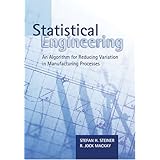
Average Reviews:

(More customer reviews)Are you looking to buy Statistical Engineering: An Algorithm for Reducing Variation in Manufacturing Processes? Here is the right place to find the great deals. we can offer discounts of up to 90% on Statistical Engineering: An Algorithm for Reducing Variation in Manufacturing Processes. Check out the link below:
>> Click Here to See Compare Prices and Get the Best Offers
Statistical Engineering: An Algorithm for Reducing Variation in Manufacturing Processes ReviewThis is NOT a typical book on statistical tools. It is a strategy book on how to search for cost-effective changes to reduce variation using empirical means (i.e. observation and experiment). The uniqueness of this book:(1) Summarizes the seven ways to reduce variation so we know the goal of the data gathering and analysis
(2) Present analysis results using graphs instead of P-value.
(3) It integrates Taguchi, Shainin methods and classical statistical approach.
It is a must read for those who are in the business of reducing variation using data, in particular for the Six Sigma Black Belts and Master Black Belts. Don't forget to read the solutions to exercises and supplementary materials to each chapter on the enclosed CD-ROM.Statistical Engineering: An Algorithm for Reducing Variation in Manufacturing Processes OverviewReducing the variation in process outputs is a key part of process improvement. For mass produced components and assemblies, reducing variation can simultaneously reduce overall cost, improve function and increase customer satisfaction with the product.The authors have structured this book around an algorithm for reducing process variation that they call "Statistical Engineering." The algorithm is designed to solve chronic problems on existing high to medium volume manufacturing and assembly processes. The fundamental basis for the algorithm is the belief that we will discover cost effective changes to the process that will reduce variation if we increase our knowledge of how and why a process behaves as it does. A key way to increase process knowledge is to learn empirically, that is, to learn by observation and experimentation.The authors discuss in detail a framework for planning and analyzing empirical investigations, known by its acronym QPDAC (Question, Plan, Data, Analysis, Conclusion). They classify all effective ways to reduce variation into seven approaches. A unique aspect of the algorithm forces early consideration of the feasibility of each of the approaches.Benefits:The CD-ROM included contains case studies, chapter exercises, chapter supplements, and six appendices.
Want to learn more information about Statistical Engineering: An Algorithm for Reducing Variation in Manufacturing Processes?
>> Click Here to See All Customer Reviews & Ratings Now
0 comments:
Post a Comment